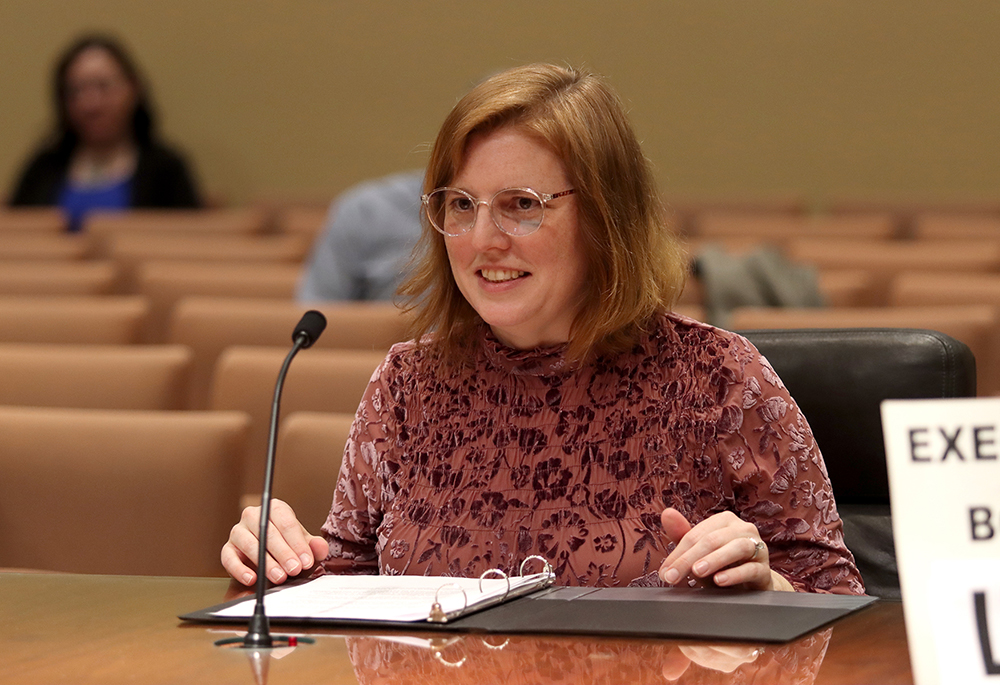
Nebraska state Sen. Machaela Cavanaugh has filibustered nearly every bill before the Nebraska Legislature since Feb. 23, the day after state Sen. Kathleen Kauth introduced a bill to ban gender-affirming surgeries, the use of puberty blockers and hormone therapy for trans youth under age 19. (Courtesy of Nebraska State Legislature)
As bills targeting trans people sweep through state legislatures around the country, a Nebraska state senator's nearly two-month-long filibuster of a ban on gender-affirming care for trans youth has drawn national attention. But most people don't know she's Catholic.
Sen. Machaela Cavanaugh attended Catholic schools from elementary school through undergraduate college and served as development director for the American province of the Servants of Mary from 2005-2008.
She told NCR that through her faith, she was taught that "the most vulnerable amongst us are the ones that we need to stand up for the most."
Since Feb. 23, the day after state Sen. Kathleen Kauth introduced the Let Them Grow Act, which would ban gender-affirming surgeries, the use of puberty blockers and hormone therapy for trans youth under age 19, Cavanaugh has filibustered nearly every single bill before the unicameral Nebraska Legislature, even the ones she supports.
Cavanaugh has held the floor through a case of strep throat, talking about everything from the bill itself to animated kids' movies to her favorite Girl Scout cookies.
It took until April 18 for the legislature to pass the first bill of the entire legislative session. By then, other Nebraska legislators in the minority, including Nebraska's first openly bisexual senator who has a trans son, had joined the filibuster, which had thus far successfully prevented the passage of the Let Them Grow Act. The bill has slowly moved through multiple rounds of debate and has drawn majority support.
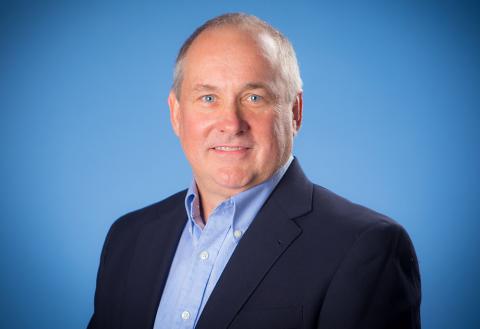
Richard Witmer, a professor of politics and government at Creighton University, said that the Nebraska Legislature's rules have allowed Cavanaugh and other Nebraska legislators in the minority to put up this level of opposition. (Courtesy of Richard Witmer)
Richard Witmer, a professor of politics and government at Creighton University, said that the Nebraska Legislature's rules have allowed Cavanaugh and other Nebraska legislators in the minority to put up this level of opposition. "A lot of states, if you're in the minority, it's just sort of tough luck," said Witmer.
"Not all legislators that are advocates for trans rights are able to use the same levers of government and the legislature to slow this down," he said, explaining why it would be difficult to replicate Cavanaugh's strategy in other states.
Even though Kauth told NCR she intends to pursue the bill next year if it fails this year, Cavanaugh cannot imagine giving up. "I will continue to stand up against hate, and I will continue to stand up for children for as long as necessary," she said.
Kauth, who was raised Catholic and previously worked for the Diocese of Des Moines but lately has attended various Protestant churches, also sees herself as defending children.
Advertisement
"It is very, very important to protect kids from experimental, irreversible medical treatments," said Kauth, who campaigned on the issue and dismisses the support for gender-affirming care by major medical associations like the American Academy of Pediatrics and the American Medical Association as profit-motivated.
"There are no studies that have proven that any of those medical interventions actually positively affect gender dysphoria or any of the problems that are associated with gender dysphoria," said Kauth.
Multiple studies have shown that access to gender-affirming care is associated with positive mental health outcomes for transgender youth, including a decrease in suicidality. Trans youth have a higher suicide risk than cisgender youth.
Additionally, a study in Pediatrics, an official journal of the American Academy of Pediatrics, shows that going through puberty without care is associated with depressive disorders and anxiety disorders.
Kauth introduced the Let Them Grow Act in January on the same day as another bill that would restrict access to school bathrooms, locker rooms and sports based on a student's sex as assigned at birth.
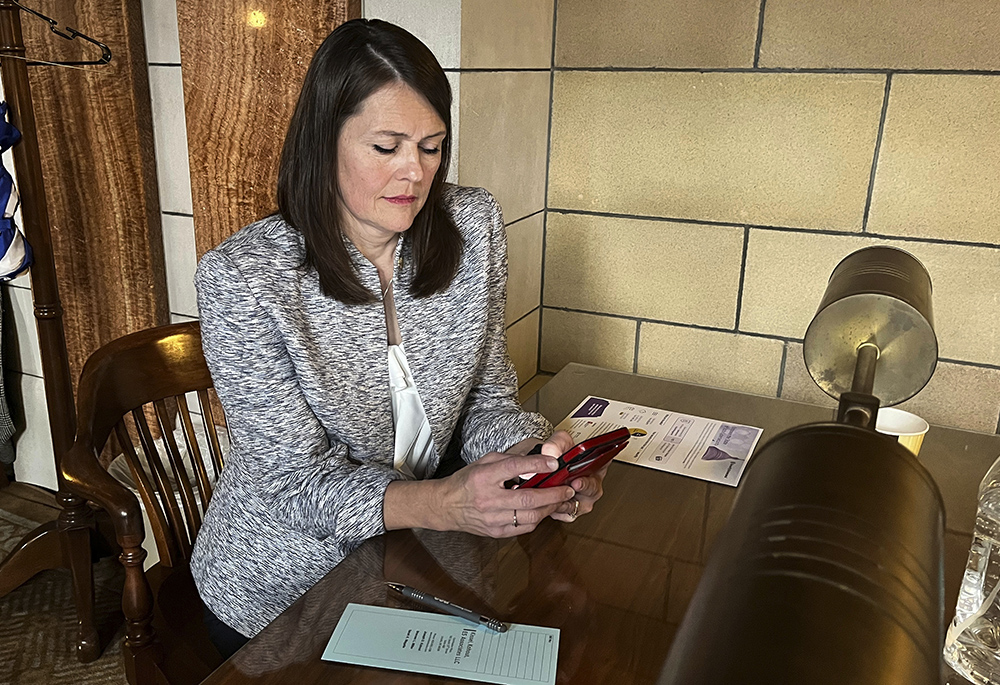
Nebraska state Sen. Kathleen Kauth works inside the Nebraska legislative chamber March 23 in Lincoln, Nebraska, as her bill, which would ban gender-affirming care for anyone 18 and younger in the state, was debated. (AP photo/Margery Beck, file)
Eli Musselman, a sophomore at St. Joseph's University in Philadelphia and a trans man, grew up "deeply embedded" in the Catholic church and said he'd call himself "Christian" and "Catholic-ish."
"Medical transition saved my life," Musselman said. He began socially transitioning when he was 15 and started testosterone hormone therapy when he was 16. At 17 during his senior year of high school, he had a chest masculinization surgery.
"If I did not receive it when I did, I might not be here today," said Musselman, emphasizing that he opposes legislation that forces trans youth to wait until adulthood for medical transition.
Alex Dworak, a family medicine doctor who serves as both an associate medical director of a community health center and a professor in Omaha, treats trans youth as part of his practice. He has advocated against the Let Them Grow Act, emphasizing he is not speaking for his employers.
"Doing nothing is not a neutral act, scientifically or ethically or religiously," said Dworak, who said he discerned becoming a Jesuit while studying at Creighton University before becoming a secular humanist.
"Staring suffering parents and children in the eyes" and denying them treatment is "a grievous sin of omission," said Dworak.
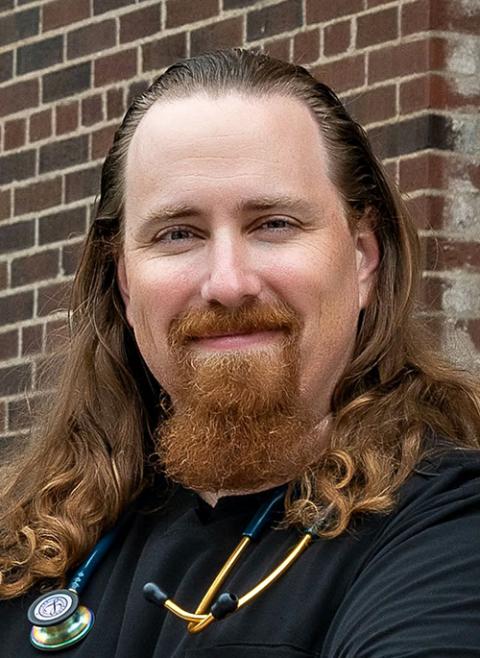
Alex Dworak, a family medicine doctor who serves as both an associate medical director of a community health center and a professor in Omaha (Courtesy of Alex Dworak)
Dworak emphasized that, in good medical practice, gender-affirming care is "individualized" and provided after thorough processes of informed consent that involve parents if the patient is a child.
Dworak said that the bill is already hurting his trans patients and their families. "My patients and their parents are already having severe worsenings of their mental health because of this," he said, explaining he has been asked to help patients come up with medical plans should they need to flee the state.
Tessa Lackey, a trans Catholic woman from Nebraska, said that the current Nebraska legislation restricting trans youth makes her and other trans friends question, "What's next?"
Kauth told NCR that she would not be pursuing legislation targeting trans adults.
Musselman called the rise of anti-LGBTQ bills "pretty frightening" and said he had not imagined that they would become so common and widespread.
He and his boyfriend, who is also trans, have talked about going to Canada for graduate school. "We don't know if we're going to be safe," he said, even though Pennsylvania has not passed any new laws targeting trans people.
Dworak is concerned that, in addition to harming trans people, the bill is harming every one of his patients by discouraging doctors from coming to Nebraska, even as the state faces a physician shortage.
"Even just by being debated, it's harming our capacity, our health care workforce, and it's hurting our future," said Dworak.
He recounted speaking with a small group of Creighton University medical students who said they all planned to leave the state for their residency programs, citing their fear of practicing medicine in a state where they would face legislation like the Let Them Grow Act.
Dworak also spoke of the difficulty he has been facing in hiring doctors for his community health center in Omaha and said that his residency program did not get a single match on the first round this year.
Lackey said that Cavanaugh's filibuster gave her "hope." Having a Catholic lawmaker stand up for her rights "means a lot," she said.
Musselman said that "it's adding years onto the lives of trans youth, trans adults, because it's really true that not having access to gender-affirming care and resources really does take lives."
To see a Catholic advocating so passionately for trans youth and adults, "it's something that I don't see a lot and I don't hear about a lot," Musselman said.
Musselman said that what Cavanaugh is doing "intrinsically feels very Catholic to me."
"Jesus would be filibustering," Musselman said.
In March, a committee of U.S. Catholic bishops released a document criticizing gender-affirming medical care for trans people.
"Any technological intervention that does not accord with the fundamental order of the human person as a unity of body and soul, including the sexual difference inscribed in the body, ultimately does not help but, rather, harms the human person," said the bishops' committee.
Cavanaugh said that it was not "compassionate" or "thoughtful" for the bishops to release a document "normalizing the public discourse around there being something wrong with someone who's transgender."
"It implies that God makes mistakes, and I don't believe God makes mistakes. I believe that transgender children are perfect the way that they are," said Cavanaugh.
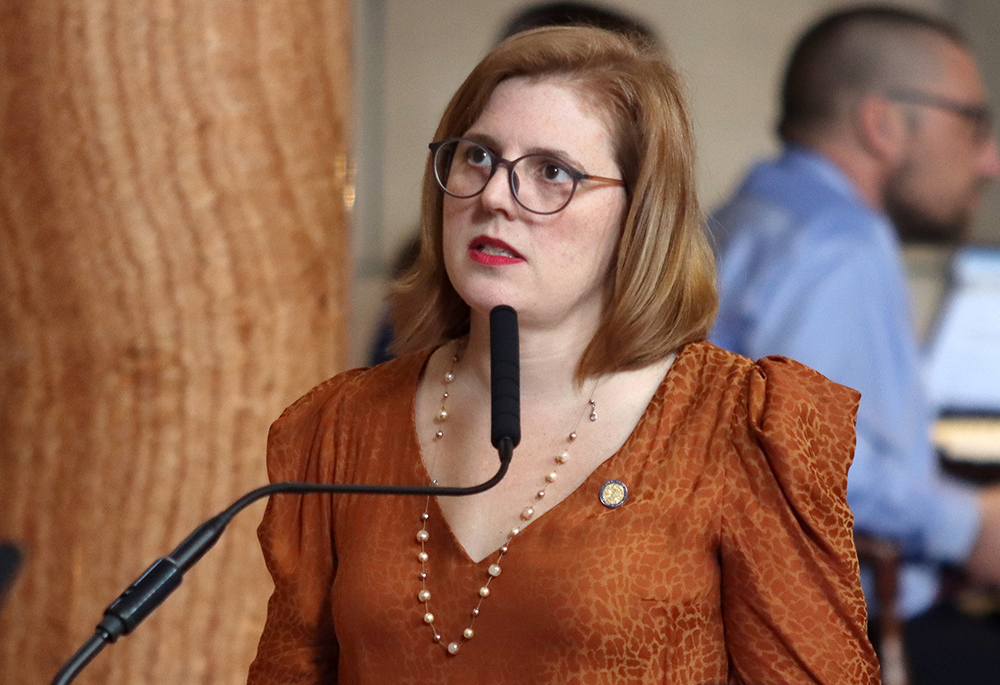
Nebraska state Sen. Machaela Cavanaugh (Courtesy of Nebraska State Legislature)
"It's good to have a more thoughtful conversation than just accepting what we are told by leaders," said Cavanaugh. "Even if I am one of the leaders, you shouldn't accept what you're told. It's always good to question and to come to your own conclusion."
Lackey, who said she prays every day and studies the Bible, said that she hasn't felt safe going to Mass in Nebraska for quite a while. "If I had felt comfortable going as myself, knowing that I wouldn't be judged for just authentically being me and my own fear of just general safety, then I would still go," Lackey said.
"Being Catholic means you come from a foundation of faith and love and community," said Lackey. "I would like to see Catholics practice what they preach about loving one another, treating others as they would like to be treated."
Growing up going to Catholic schools, Lackey said that she struggled with internal judgment and questioning around her gender. Now, she says, "I'm happy. I've got so much. I've got a wonderful friend group of individuals who are supportive of each other."







